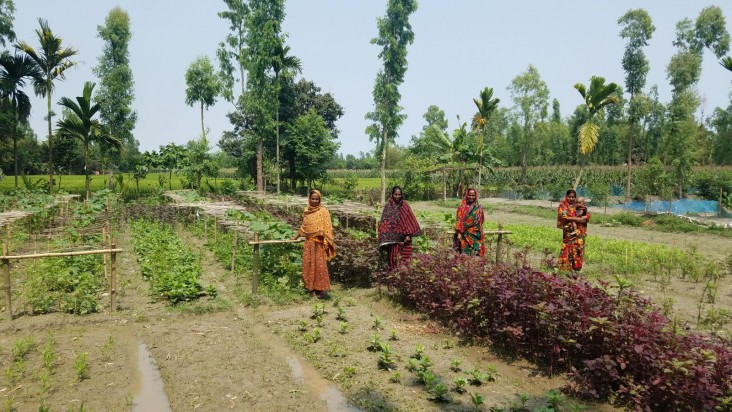Speeches Shim

Skills Training Increases Crop Production, Incomes
“Before, we had to travel to buy our vegetables from the market, but now, with our own garden, we make what we need and have more choices at home.”
The program improves the food security of people living in northern Bangladesh holistically -- by improving access to income, encouraging good nutrition and hygiene practices, and helping communities adapt to and recover from natural disasters. One intervention in particular is the Farmer Field Business School, which trains poor farmers in agricultural technologies, such as basic crop cultivation and livestock rearing practices, providing them with the skills to make a living. When Najma, Corimon, Samina and Moiful heard their village leaders talk about this initiative, they decided to join to enhance their skills and take their food security into their own hands.
Prior to their training, the women only grew one vegetable at a time, which was hardly enough to feed their families, let alone to sell. But through the Farmer Field Business School, they were taught to plant a mixture of vegetables all at once to increase the variety of vegetables in their garden. They also learned how to identify and collect seeds yield the best quality vegetables, how to make compost and how to plough the land to cultivate the soil. “Before, we had to travel to buy our vegetables from the market, but now, with our own garden, we make what we need and have more choices at home,” Najma says.
The women pooled the money they earned from selling chicken eggs and leased a plot of land for two years for roughly $23.60. On their plot, Najma, Corimon, Samina and Moiful work together to grow spinach, chili, okra and cucumbers. The skills they learned have enabled them to increase their vegetable production, ensuring that they have nutritious foods to feed their families and allowing them to sell whatever is left. “The program has enhanced our knowledge and now we are happy,” Samina says.
In addition to CARE, USAID also supports World Vision and Helen Keller International, to implement gender-equitable food security and resilience programming for poor communities across Bangladesh.
LINKS
USAID’s Office of Food for Peace
Follow @USAIDFFP

Comment
Make a general inquiry or suggest an improvement.